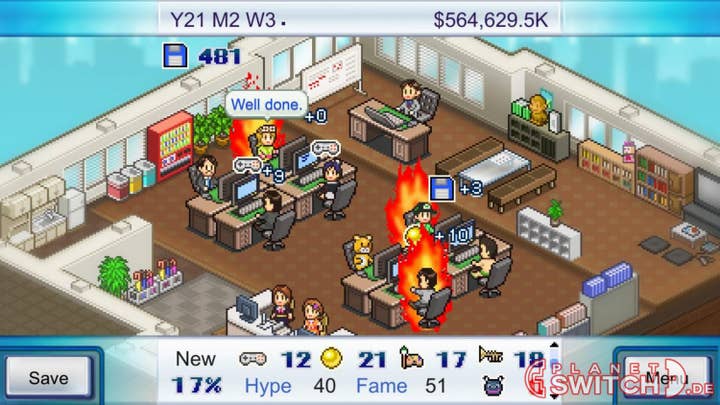Is crunch being solved or just outsourced? | Opinion
Attitudes have turned sharply against crunch, but efforts to improve working conditions often merely outsource the problems to less famous firms
After decades of attempts by many different groups to bring attention to working conditions in game development and the almost non-stop "crunch" that is endemic at some studios, there's a sense that we might finally be seeing some progress.
Perhaps it's the threat of unionisation stalking the industry; perhaps it's just part of a growing sense of attention to working conditions generally, and changing values towards work and workplaces among younger generations -- but attitudes to crunch are definitely starting to shift. Just as a few years ago people came around en masse to the inherently abusive nature of promising "exposure" in return for doing work for free, the mislabelling of crunch and punishing overtime schedules as "passion" by cynical bosses is starting to backfire dramatically, and not a moment too soon.
As a result, where once companies bragged in public about the crazy hours their developers were working -- albeit in a rather dishonest way which made the development process sound like a non-stop pizza-and-coke LAN party, rather than a gruelling and exhausting slog that took a terrible toll on employees' health and relationships -- this has suddenly become a massive faux pas. Some senior staff are still adapting to the new reality; like a grandparent bemused as to why their racist joke earns scowls rather than chuckles over Christmas dinner, the occasional industry executive will still toss out a casual mention of teams working hundreds of hours of overtime to finish a title, then seem genuinely confused about why that's attracting criticism rather than impressed adulation. By and large, though, companies are starting to recognise that treating employees reasonably well plays better with their consumers than operating digital sweat-shops.
"This is a positive trend, thus far it's also a trend that's limited to a very specific and elite part of the industry"
This change of heart is welcome not least because it allows companies to do the right thing and be proud about it, rather than apologetic. Bungie is a company that has had its own very public struggles with crunch culture, but this week it came out and announced bluntly that it was delaying an upcoming patch to Destiny 2 in order to avoid putting too much strain on its employees' work-life balance.
That seems like such a simple statement; "we can't finish this on its original schedule without abusing our staff, so we're going to delay it" should not be controversial in any reasonable universe, especially given that the product in question is a game, not a life-saving medical device or an emergency service. Yet only a few years ago a statement like that would have been inconceivable -- no company would have said such a thing and had they done so, their most vocal customers would have eaten them alive for it.
It's great, then, to see Bungie joining the (admittedly still short) list of companies that have openly said they were holding back releases so their staff wouldn't be burned out by crunch hours. It's even better that the reaction has been broadly positive, paving the road for other studios to do the right thing in the same way. All the same, we should be cautious of looking at stories like this and thinking "great, that's the crunch problem solved" -- because the reality is that for all that this is a positive trend, thus far it's also a trend that's limited to a very specific and elite part of the industry.
"The vast majority of developers simply do not ask about staff conditions when picking an outsourcing partner"
Among the firms that have so far come out and said that they're changing schedules or work practices to eliminate or reduce crunch, there's a significant common factor - they're almost all successful, well-known firms with well-established, self-owned games and franchises. Eliminating crunch isn't a cost-free exercise for them and they should still be lauded for their efforts -- but we should also recognise that they are uniquely positioned to actually do something about employee conditions, in a way that many of the industry's employers are not.
The reality is that employee conditions remain miserable in much of the games industry -- it's just that those poor conditions have increasingly been pushed away to arm's length through a combination of contracting and outsourcing. Crunch and overall treatment of employees has always been at its worst not at elite, well-known studios, but at work-for-hire and outsourcing shops -- companies that deal with other people's IPs and are often pushed into accepting totally crazy deadlines and milestones from publishers and rights-holders just in order to secure enough work to keep the doors open.

More and more of the work on major games is being pushed out to work-for-hire studios, often located in places with rather less rigid employment protections than the main development team might enjoy. At the same time, a lot of studios have expanded their use of temporary contractors who often don't receive the same treatment and benefits as a full-time employee during their time at the company.
"This problem isn't solved if it's simply been passed down the line to different, less famous firms"
What we've ended up with is a two-tier industry, in other words, with all of the concern about crunch and employee conditions being focused on a frontline tier of famous, well-funded developers and publishers. Many of those companies can quite legitimately say that they're good places to work, having put great effort into improving the work-life balance and conditions of their employees.
However, a great deal of the work on the games they create relies on a second tier of staff -- temporary contractors (who may be hired through a deal with a staffing agency so they're never technically employees of the studio) and workers at outsourcing studios. Those people technically work for companies that consumers have never heard of, sometimes in countries quite far away, and they often work insane hours in bad conditions for poor pay and little job stability. It's to these people that the top-tier companies have effectively outsourced their crunch.
The problem is that it's hard to say who's actually doing this and who isn't. We have far less visibility into conditions at these firms, and they're often working for multiple different publishers and developers simultaneously, so who's to say which was the hard-driven deal that ultimately resulted in their staff not seeing their kids for an entire week? Cynically speaking, that's part of the value of outsourcing -- it reduces visibility and thus removes responsibility -- but what we can say is that the vast majority of developers simply do not ask about staff conditions when picking an outsourcing partner. Maybe they just don't think to ask; maybe they think of it, but decide they'd rather not know the answer.
The fact that companies like Bungie are throwing a light on the issue of crunch and demonstrating how unacceptable it has become is nonetheless very positive. It doesn't mean the problem is solved, but it's a stick with which to beat the rest of the industry. If Bungie, running a service-based game and having recently taken on the huge responsibility of keeping it going without publisher backing, can give its employees some breathing space then there's no excuse for any other company's failure to do so.
Ultimately, though, the attention to this issue is going to have to pass downstream to the outsourcing and contracting firms which now do so much of the work on our games. This problem isn't solved if it's simply been passed down the line to different, less famous firms; crunch needs to be fixed with better management and business practices, not by subcontracting to little-known companies and hoping their obscurity keeps them out of the headlines.

